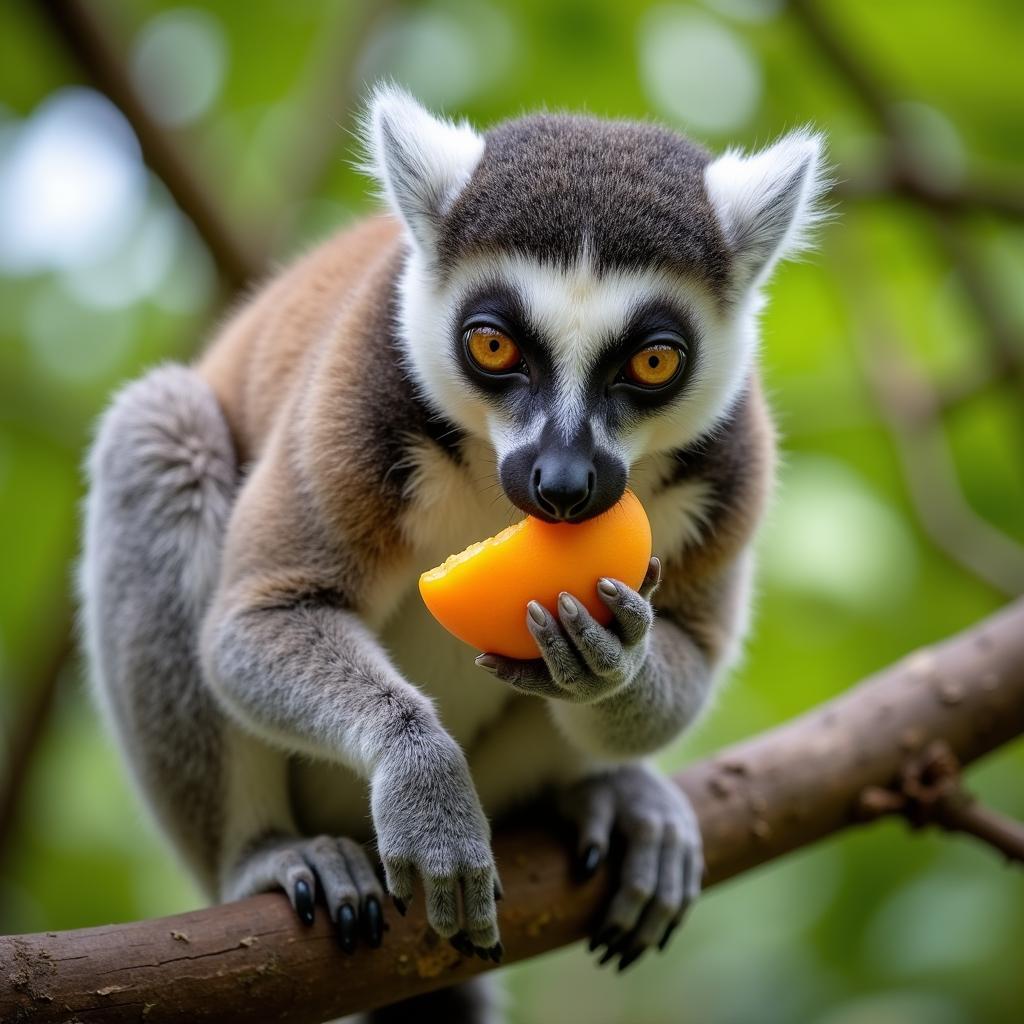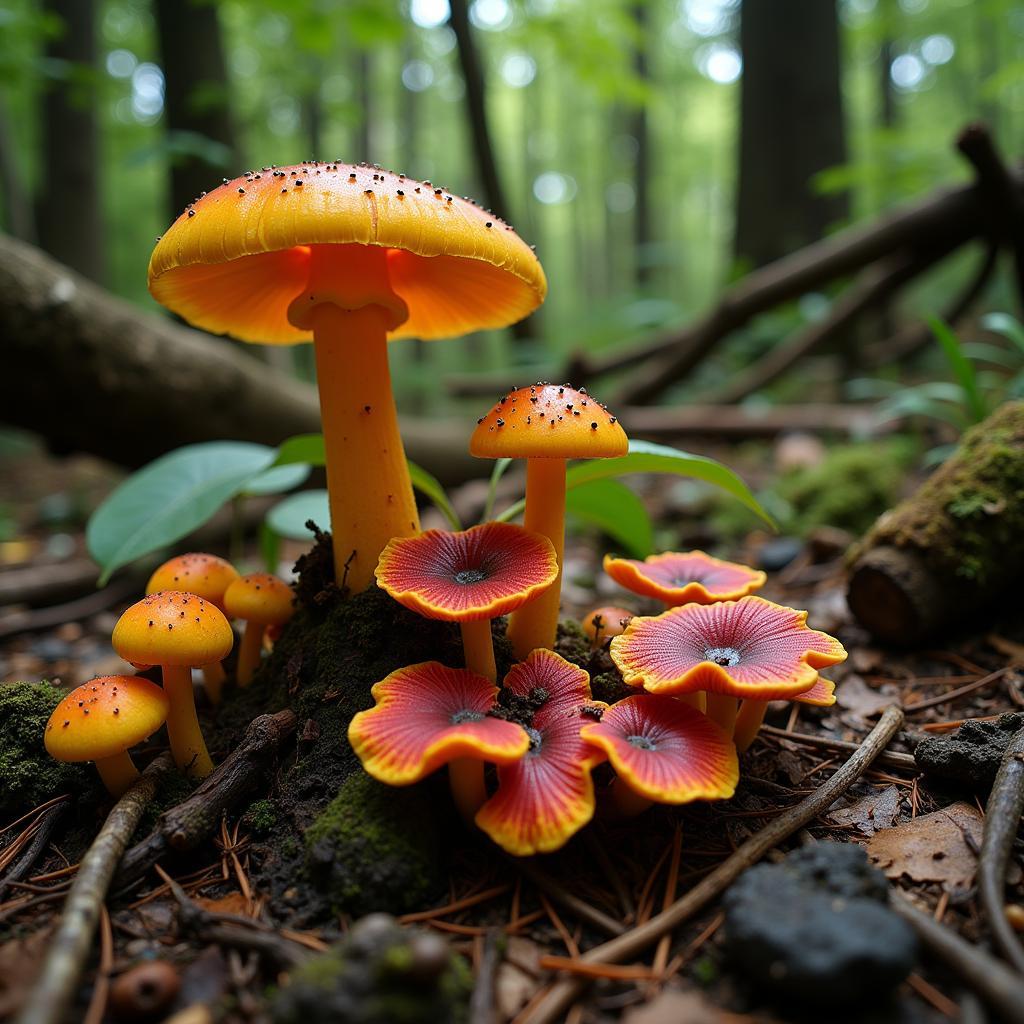The Madagascar Food Web, a captivating tapestry of life, reveals the intricate network of feeding relationships within the island nation’s unique ecosystems. From the apex predators to the tiniest decomposers, each organism plays a vital role in maintaining the delicate balance of nature. Understanding the Madagascar food web provides invaluable insights into the ecological dynamics of this biodiversity hotspot.
The Foundation of the Food Web: Producers
At the base of the Madagascar food web lie the producers, primarily plants that capture sunlight and convert it into energy through photosynthesis. These remarkable organisms form the foundation upon which all other life depends. Madagascar’s diverse flora, including iconic baobab trees, lush rainforests, and spiny forests, provides a rich array of food sources for herbivores.
 Lush rainforest canopy in Madagascar
Lush rainforest canopy in Madagascar
Herbivores: The Plant Eaters
A fascinating array of herbivores has evolved to exploit the abundance of plant life in Madagascar. Lemurs, the island’s charismatic primates, are primarily herbivorous, feeding on fruits, leaves, and flowers. Their specialized diets and feeding behaviors contribute to seed dispersal, playing a crucial role in forest regeneration.
Other notable herbivores include the iconic giraffe weevil, with its elongated neck adapted for reaching leaves high in the canopy, and the red-footed tortoise, which grazes on grasses and low-lying vegetation.
 Lemur enjoying fruit in Madagascar
Lemur enjoying fruit in Madagascar
Carnivores: The Hunters of the Island
Madagascar’s carnivores occupy the upper levels of the food web, playing a critical role in regulating prey populations. The fossa, a cat-like carnivore endemic to the island, reigns supreme as the apex predator. With its agility and stealth, the fossa hunts lemurs, birds, and reptiles, keeping their numbers in check.
Other fascinating carnivores include the Malagasy civet, a nocturnal predator that feeds on small mammals, birds, and insects, and the Madagascar serpent eagle, which soars through the skies, preying on snakes and lizards.
Decomposers: The Recyclers of Nutrients
No food web would be complete without the essential role of decomposers. These organisms, primarily bacteria and fungi, break down dead plants and animals, returning vital nutrients to the ecosystem. In the humid rainforests of Madagascar, decomposers thrive, rapidly recycling organic matter and enriching the soil.
 Colorful fungi on the Madagascar forest floor
Colorful fungi on the Madagascar forest floor
The Interconnectedness of Life
The Madagascar food web is not a linear chain but a complex web of interconnected relationships. Changes in one part of the web can have cascading effects throughout the ecosystem. For instance, deforestation can lead to habitat loss for lemurs, impacting both their predators and the plants they rely on.
Conclusion
Exploring the Madagascar food web reveals the intricate balance of life on this remarkable island. From the smallest insects to the largest predators, each organism plays a vital role in maintaining the health and biodiversity of Madagascar’s ecosystems. By understanding these complex relationships, we can better appreciate the need for conservation efforts to protect this unique and fragile natural heritage.
FAQs
1. What is the apex predator in the Madagascar food web?
The fossa is considered the apex predator in the Madagascar food web.
2. How does deforestation impact the Madagascar food web?
Deforestation leads to habitat loss, impacting various species and disrupting the delicate balance of the food web.
3. What is the role of decomposers in the food web?
Decomposers break down dead organic matter, returning essential nutrients to the ecosystem.
4. Why are lemurs important to the Madagascar food web?
Lemurs contribute to seed dispersal and serve as a food source for predators.
5. How can I learn more about the Madagascar food web?
For further assistance, please contact us at Phone Number: 02437655121, Email: minacones@gmail.com or visit us at 3PGH+8R9, ĐT70A, thôn Trung, Bắc Từ Liêm, Hà Nội, Việt Nam. Our dedicated customer support team is available 24/7 to assist you.